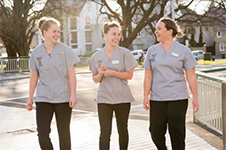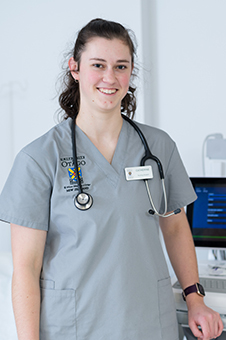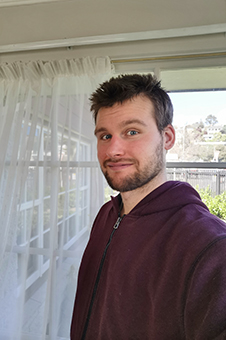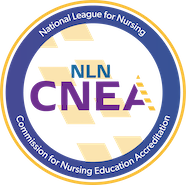Applications for the Master of Nursing Science in 2026 open on 1 May 2025 and close on 31 August 2025.
Become a nurse – build on any degree
The Master of Nursing Science (MNSc) offers an intensive two-year pathway to nursing registration for graduates of any discipline. A part-time study pathway is also available.
On successful completion of the MNSc students will be eligible to apply for registration in Aotearoa New Zealand and the United States.
The MNSc is taught from our University of Otago Christchurch campus, with clinical experience placements available throughout the South Island. Teaching follows a hybrid model, with a mixture of both in-person and online attendance.
You will learn through a mixture of lectures and case-based learning, facilitated online learning, clinical skills development in the simulation laboratory, and clinical placements.
Accredited in Aotearoa New Zealand and the United States
The University of Otago, Master's Degree in Nursing Pre-licensure Program, is accredited by the National League for Nursing Commission for Nursing Education Accreditation (NLN CNEA) located at 2600 Virginia Avenue, NW, Washington, DC 20037. 202-909-2487.
The MNSc is also accredited by the Nursing Council of New Zealand ( NCNZ ).
Why study nursing at Otago?
 The Department of Nursing (formerly the Centre for Postgraduate Nursing Studies) ranked in the world's top 150 nursing schools (QS World University Ranking by Subject 2025).
The Department of Nursing (formerly the Centre for Postgraduate Nursing Studies) ranked in the world's top 150 nursing schools (QS World University Ranking by Subject 2025).
As a global in-demand profession the Master of Nursing Science degree offers a gateway to a great career outlook and job security both in New Zealand and overseas.
On our Christchurch campus, you'll be taught by highly-qualified academic staff with strong clinical links throughout New Zealand. You'll benefit from the latest nursing research and technology, and will have access to the impressive University of Otago Christchurch Simulation Centre. You will undertake between 1,000 and 1,160 hours of clinical practice to facilitate the integration of theory, research, and practical skills.
As New Zealand's most medical- and research-intensive campus we are well equipped to support your nursing career goals.
Student experience

“I chose nursing as a career because I realise that our health system is challenging to navigate and has its cracks, but if I could bring comfort, hope and help to someone in need, I would feel so fulfilled.
“I love the practical aspect of the Master of Nursing Science. During the placements and simulation sessions, I've been able to consolidate my learning and gain confidence as a nurse. I appreciate all my classmates – our different backgrounds and life experiences enables us to have widened class discussions and a mature nursing education.”
— Catherine Hooker – Studying for a Master of Nursing Science
Catherine Hooker's profile page

“I completed an honours degree in Neuroscience and was wondering what to do for a career. As I began researching my options I stumbled upon the MNSc program. It built on my current degree, would enable me to graduate with a master's, and meant that I could be in paid employment and on the front line of health in only two years. It certainly ticked all the right boxes.
“I enjoyed being in a small class of intelligent people, with an awesome and varied collective knowledge and skill set. The lecturers were highly supportive and dedicated, creating a highly conducive environment for learning. While there was a high workload, all content was self-directed learning and the research project was a great exercise in academic creativity and freedom. I entered nursing feeling like I was ready for my career.” — Isaiah Svoboda, Registered Nurse at The Princess Margaret Hospital, Christchurch – Graduate of the Master of Nursing Science
Course content
The Master of Nursing Science ( MNSc ) consists of 12 taught papers and a 30-point research project. You must complete all papers.
First-year papers
- NURS 441 Professional Nursing
- NURS 442 Health Care in New Zealand
- NURS 443 Nursing Science 1
- NURS 444 Nursing Science 2
- NURS 445 Introduction to Clinical Nursing Practice
- NURS 446 Nursing Clients with Altered Health States
- NURS 447 Applied Nursing Research
Second-year papers
- NURS 501 Nursing Science 3
- NURS 502 Mental Health Nursing
- NURS 503 Nursing Clients with Complex Health States
- NURS 504 Consolidation of Practice
- NURS 581 Integrating Practice
- NURS 582 Policy Analysis
Entry requirements
The Master of Nursing Science ( MNSc ) is a postgraduate qualification. It is open to graduates from any discipline who achieved a 'B' average from the final two years of their degree.
How to apply
We welcome your questions about the Master of Nursing Science ( MNSc ) degree.
Please contact us at any time:
Tel +64 21 279 6161
Email postgrad.uoc@otago.ac.nz
If you're an international student, your application process is different. Please contact the International Office for advice.
When you apply to enrol in the MNSc degree, we will require the following details:
- An up-to-date copy of your CV that includes:
- Current and recent past employent
- Community activities
- Participation in sports and voluntary work
- Statement of Interest (PDF) outlining your reasons for wanting to become a nurse (up to 300 words).
- Completed and signed Health Sciences Declaration Form (PDF)
- Completed Referee Form (PDF) from two referees.
If this is your first time studying with the University of Otago, you may be asked for additional documents such as:
- Academic transcript / record from any other institutions attended
- Birth certificate
- Certified IELTS results
- Marriage certificate
- Passport
View regulations for the MNSc degree
Outcome of application
- Selection into the programme will be assessed by means of your academic record, your CV , Statement of Interest and your two confidential referee reports. Applicants may also be invited to attend an interview.
- If your application has not been successful you will be notified of this via your eVision student portal.
- If you are successful following the selection process you will be offered a place in the programme via your eVision student portal. This may be a conditional offer if, for example, we have not received all documentation required to complete your application.
- To accept your offer you must complete an online response to the offer. Even if you do not wish to accept any offer made to you, you must still complete the online response to offer process.
- If you receive notification that you have been placed on the Waiting List for the Master of Nursing Science you will be contacted should a place become available. You can be offered a place from a waiting list right up to the time classes begin. Where students are on the waiting list and have exactly the same score, a balloting system will be used to determine who is offered a place.
- Entry into the programme is competitive and places may be limited due to the number of clinical placements available.
- Applicants must have their personal and financial affairs in order when they apply so that if their application is successful, they are able to take up a place at the start of the first semester.
Please be advised that the University of Otago's Student Experience Admissions office will not be held responsible for any communication problems because of an applicant's failure to provide and check an appropriate email.
Māori and New Zealand Resident Indigenous Pacific applicants
The University of Otago is committed to initiatives that increase the number of indigenous Māori and indigenous Pacific Island graduates. The Division of Health Sciences is focused on ensuring that New Zealand's diverse health workforce needs are met, to honouring the principles of the Treaty of Waitangi / Tiriti o Waitangi, and promoting academic equity for under-represented groups.
Selection Criteria
Selection of candidates for the Master of Nursing Science programme from among those meeting the eligibility requirements established by the programme regulations conforms to the following criteria:
- Those applying as members of an equity group undergo additional preliminary assessments:
- Applicants are confirmed as equity group members in accordance with the programme regulations.
- Confirmed equity group applicants are then considered by the Divisional Academic Board or its delegate against selection attributes for each specific equity group relating to the policy rationale of Te Kauae Parāoa. These attributes are approved by the Divisional Academic Board and published at:
Health Sciences Selection Criteria Attributes
On the basis of these assessments, confirmed equity group members who are also established as meeting the policy rationale of Te Kauae Parāoa will be prioritized in the selection process outlined below.
- Applicants submit academic records, a CV , and a statement of interest. On the basis of these materials, the Committee first assess applicants as suitable for the programme, and in some cases applicants may be selected for the programme without further assessment.
- In other cases, where additional information is required to determine suitability, applicants may be advanced for further assessment via an interview. The interview may consider the strengths of the candidate across the following areas:
- Motivations
- Personal attributes
- Prior knowledge/understanding of the profession
- Verbal presentation and comprehension
- Final selection of interviewed candidates is on the basis of the Committee’s ranking, taking into account all written materials and (where relevant) interview, and the number of places available to the programme as a whole. Selections are made in the following sequence:
- Equity group applicants in the following sequence:
- Māori
- Resident Indigenous Pacific
- Refugee Background
- Socioeconomic Equity
- Rural
- General applicants.
Additional information to assist your application
Deferral of entry
Successful candidates may request to defer their entry to the following academic year. Requests will be considered on the following grounds:
- Serious medical grounds or other exceptional circumstances. Candidates that are approved deferral on medical grounds or exceptional circumstances will be required to provide evidence that they are able to resume study. This evidence must reach the Master of Nursing Science administrator by 1 September in the year following your deferral year.
Deferrals will only be granted for a maximum period of one academic year.
To apply for a deferral of entry please complete and return the Deferral Form ( PDF )
Health and disabilities
Please contact the University of Otago's Manager of Disability Information and Support if you have a mental or physical condition that may affect whether or not you are able to meet the requirements of a programme or obtain professional registration.
Health conditions include:
- Physical conditions
- Mental conditions
- Psychological conditions
Applicants who have a mental or physical condition should declare this on the Division of Health Science Declaration Form.
Criminal offences
Applicants who have been charged with a criminal offence, and/or are currently facing disciplinary proceedings (including drink driving and traffic offences) should declare this on their Division of Health Science Declaration form.
As some convictions may prohibit registration, applicants are advised to consult the regulations of the appropriate registering professional body, in this instance the Nursing Council of New Zealand.
All applicants must consent to verification from the New Zealand Police that there are no undeclared criminal charges or convictions.
Any applicant who has resided in Australia must consent to verification from the Australian Police that there are no undeclared criminal charges or convictions.
The Children's Act ( CA ) 2014 introduces new requirements for organisations, therefore CA A-compliant vetting may be used as part of your admission to the Master of Nursing Science.
The New Zealand Police website has further information on both the Clean Slate and CA .
Sensitive issues
Nursing is a profession that requires physical contract with those we are caring for. In the Master of Nursing Science programme all students must participate in laboratory, practical and clinical activities, including those that may be unusual in some cultures.
Simulation laboratory learning will require individuals to practise clinical activities including those that involve physical contact with other students. Training occurs under close supervision and all students are required to participate, as it is essential for their acquisition of clinical skills.
First aid certificate
All candidates who accept a place into the Master of Nursing Science must provide a certified copy of a current New Zealand First Aid Certificate before the start of the programme.
Applicants must gain this qualification through a NZQA-registered training provider who is authorised to assess NZQA first aid standards.
The certificate should include NZQA Standards 6400, 6401, 6402.
The following are a selection of recommended training courses:
- St John (First Aid Level Two)
- New Zealand Red Cross (Comprehensive First Aid Course)
Immunity status
All applicants who are offered and accept a place in the Master of Nursing Science programme will be required to provide evidence of their serology status.
Because of the nature of their practice, health professionals are required to take steps to ensure they neither acquire infections from their patients nor transmit infections to patients.
Immunity testing arrangements will be made known before the start of the programme.
Students should read and understand the full information regarding the Infectious Diseases Policy (PDF)
Resources
Logo of the National League for Nursing Commission for Nursing Education Accreditation in the United States
